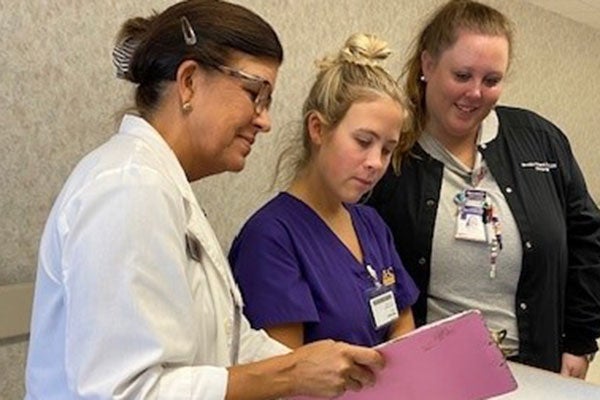ECU, ECU Health announce new academic practice collaboration
Program aims to increase advanced practice professionals in critical care settings
East Carolina University and ECU Health are launching an initiative to increase the number of adult gerontology acute care nurse practitioners serving as advanced practice health care professionals in ECU Health’s critical care settings. This effort builds on the collective commitment of both organization to solve the rural health challenges in the region as well as the state.
The effort – conceived by nursing and education leaders from ECU’s College of Nursing and ECU Health – will benefit both the university and the health system, said Dr. Bim Akintade, the dean of ECU’s College of Nursing. An investment of nearly $1.5 million over five years from ECU Health will increase the College of Nursing’s capacity to graduate trained and qualified nurses who can meet the growing need for acute care practitioners to treat the hospital’s sickest patients.

Brooke Roane, staff nurse on Medical Oncology at ECU Health, is pictured with her mentor, Kelli Jones, clinical assistant professor from ECU’s College of Nursing and Riley Veazey, a nursing student. (ECU Health Photo)
“ECU Health is proud of its close relationship with ECU and the College of Nursing, particularly as it pertains to our efforts to adapt to the national health care workforce shortage,” said Dr. Daphne Brewington, ECU Health’s vice president of nursing. “Our success as an academic health system is predicated on our ability to leverage clinical and academic excellence in order to ensure we can provide high quality health care for the residents of eastern North Carolina.”
Nationally, the aging population is growing, accompanied by the shortage of health care workers. This collaboration not only strengthens the health care workforce in eastern North Carolina but also contributes to improved health outcomes and increased accessibility to specialized care for older adults in the communities of eastern North Carolina.
Through this effort, ECU Health is helping fund the development of a new Adult Gerontology Acute Care Nurse Practitioner Post Graduate Certificate, which will train current nurse practitioners to treat acute care adult patients. The investment also provides funding for a program director who teaches and an additional part-time faculty member as well as administrative support and operational costs.
The program will reserve six enrollments per enrollment cycle for current ECU Health employees, highlighting the importance of providing specialized training that benefits the region.
“Our plan is to take the next few months to work with our partners at ECU Health and find clinical placement sites in critical care environments for ECU Health employees who enroll in the program,” Akintade said. “They need nurses, and training nurses is our business and passion. This collaboration is a win-win and makes complete sense for the university, the heath system, the region, and the state.”
Clinical placements for students employed by ECU Health will take place at ECU Health facilities, which will help to alleviate a major sticking point for training advance practice nurses – finding clinical placements for students in training. It also has the potential to create pathways for those in the program to experience acute care at both ECU Health Medical Center and in ECU Health’s regional community hospitals.
The initiative isn’t limited to the current arrangement and both ECU and ECU Health continue to explore ways to leverage this effort to design innovative solutions that benefit the people of eastern North Carolina.
“Eastern North Carolina depends on institutions like ECU Health and ECU to collaborate on innovative solutions that drive us towards our mission of improving the health and well-being of the region,” said Dr. Trish Baise, ECU Health’s chief nursing executive. “As a health system serving 1.4 million people, we need more nurses at every level in order to meet the region’s immense needs. The College of Nursing is one of the premiere nursing education schools in the nation and our health system is great training ground for developing a health care workforce with a focus on rural health challenges. I am excited to see the benefit this program will have on our patients and team members.”
About ECU Health
ECU Health is a mission-driven, 1708-bed academic health care system serving more than 1.4 million people in 29 eastern North Carolina counties. The not-for-profit system is comprised of more than 14,000 team members, nine hospitals and a physician group that encompasses over 1,100 academic and community providers practicing in over 185 primary and specialty clinics located in more than 110 locations. The flagship ECU Health Medical Center, a Level I Trauma Center, and ECU Health Maynard Children’s Hospital serve as the primary teaching hospitals for the Brody School of Medicine at East Carolina University. ECU Health and the Brody School of Medicine share a combined academic mission to improve the health and well-being of eastern North Carolina through patient care, education and research. For more information, visit ECUHealth.org
About ECU
East Carolina University offers more than 85 bachelor’s, 68 master’s and 13 doctoral degrees to 27,000 students on its Greenville, North Carolina, campus and through an acclaimed online learning program. The university’s school of medicine consistently ranks No. 1 in North Carolina – and in the top 10% nationally – for graduating physicians who practice in-state, practice primary care and practice in rural and underserved areas. ECU boasts the largest business school enrollment and largest number of new nurses and education professionals produced by a four-year North Carolina university, in addition to the largest studio art program in the state. The university has a globally recognized academic underwater archaeology program and has a supportive relationship with the U.S. military services. Located near Atlantic coast harbors where pirates once roamed, ECU adopted the “Pirates” mascot in 1934 for its athletics program and competes in NCAA Division 1.
###
East Carolina University News Services
Howard House, 1001 E. Fifth Street
Greenville, NC 27858
ecunews@ecu.edu
Phone: 252-328-6481
https://news.ecu.edu